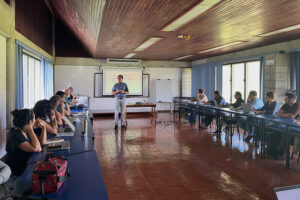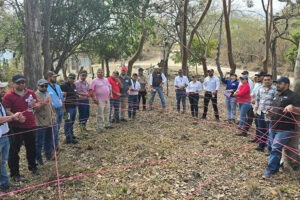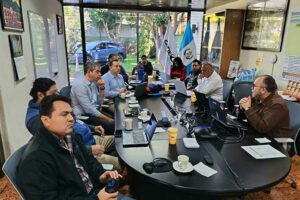Latin America Shares Local Experiences on Climate, Peace, and Security at the Geneva Peace Week 2025
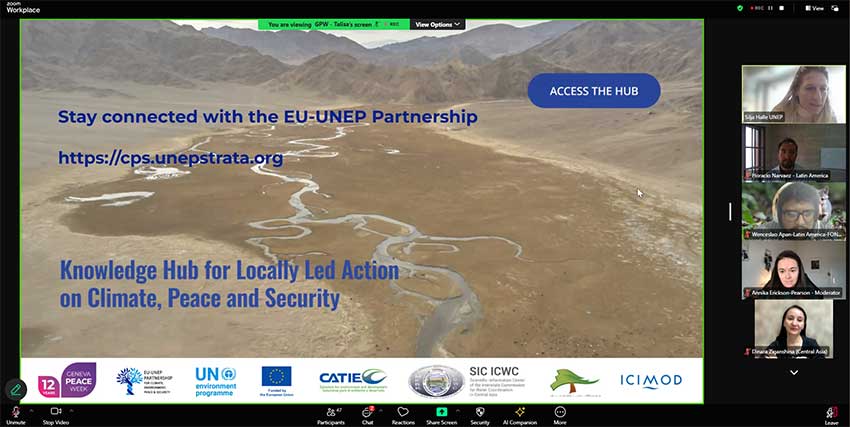
- CATIE and three of its partner organizations implementing the PARES Project shared lessons learned on how nature-based solutions strengthen resilience and cooperation across landscapes.
n October 16, within the framework of the Geneva Peace Week 2025, the Tropical Agricultural Research and Higher Education Center (CATIE) led the Latin American regional session of the event “Locally Led Action on Climate, Peace, and Stability.” This session brought together experiences from local organizations driving climate action from their territories, showing how nature-based solutions (NbS) can strengthen peace and environmental security.
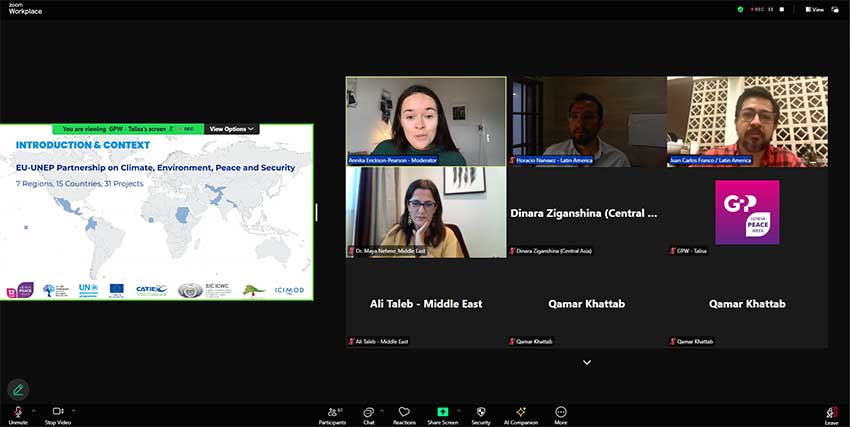
The session was moderated by Dr. Pablo Imbach, Leader of CATIE’s Climate Action Unit, and featured the participation of Horacio Narváez, Monitoring, Evaluation, and Learning (MEAL) Officer of Tierra Viva (Ecuador); Wenceslao Apan, Director of Conservation and Sustainability at El Triunfo Conservation Fund (FONCET) (Mexico); and Juan Carlos Franco, President of CECROPIA (Mexico). Their interventions showcased the diversity of contexts in which the climate–peace–security nexus manifests, and how Latin American communities are responding through innovative, collaborative, and sustainable approaches.
During his presentation, Dr. Imbach outlined the regional panorama of the main challenges Latin America faces regarding climate and security. He noted that the climate–security nexus is already a reality, where droughts, fires, deforestation, and glacial retreat combine with inequality and institutional fragility, affecting livelihoods, social cohesion, and territorial governance. Nevertheless, he emphasized that response actions must be designed through participatory processes that harness landscape assets—such as community organization, local knowledge, community resources, and NbS—that enable positive resilience for peace.
The Climate Action Unit leader also highlighted the progress of the PARES Project (Peace, Action, Resilience and Sustainability), implemented by CATIE together with the United Nations Environment Programme (UNEP) and financed by the European Union (EU). He explained that through participatory diagnostics, pilot adaptation design, adaptation pathway planning, and a regional community of practice, the project has strengthened the technical and governance capacities of 12 local organizations. Climate action must be inclusive, locally led, and oriented toward social stability. Only then can we transform vulnerability into resilience and adaptation into a pathway to peace,” he stated.
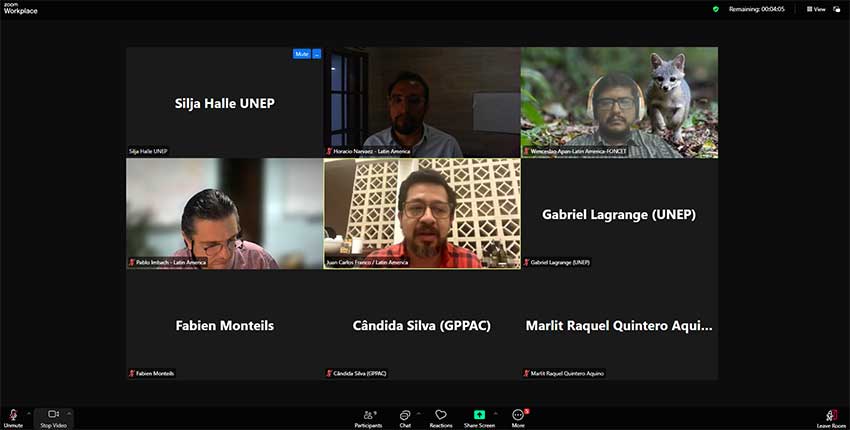
From Ecuador, Horacio Narváez of Tierra Viva shared the experience in the Ambuquí landscape, where communities face water scarcity and seek to strengthen their governance. He emphasized that environmental security depends both on technical management and on the social agreements that guarantee cooperation, noting that the NbS applied—such as water-harvesting systems and restoration of degraded areas—not only improve resource availability but also foster social cohesion.
In Mexico, Wenceslao Apan of El Triunfo Conservation Fund (FONCET) described how communities in the Lagartero River sub-basin confront droughts, fires, and conflicts over water use. He explained that the initiatives promoted—such as community fire-management brigades, conversion to silvopastoral systems, and mangrove restoration—strengthen organization, reduce risks, and promote social inclusion.
Finally, Juan Carlos Franco of CECROPIA highlighted that in Chiapas, communities face pressures on their livelihoods due to climate variability and the presence of organized crime. He noted that since 2015 the organization has worked alongside communities to develop livelihoods based on sustainable ecosystem management. Within the framework of PARES, NbS applied at the micro-watershed scale have strengthened the social fabric and helped influence state public policies focused on restoration and resilience, with estimated investments of around € 4.7 million in 2025 and € 11.6 million by 2026.
Discussions during the event underscored the importance of the model developed for diagnostics, planning, and piloting of activities as enablers to connect local efforts with national agendas; the potential of community-level leadership and organization to respond to the multiple pressures territories face; and the innovations communities generate by integrating relationships among environment, climate, and security into their strategies.
The PARES Project, coordinated by CATIE under the EU–UNEP partnership, promotes in 12 Latin American landscapes a capacity-building and territorial-planning process with a resilience-and-peace focus. Through participatory diagnostics, adaptation pilots, adaptation pathways, and a regional community of practice, the project seeks to turn local climate action into an effective strategy for conflict prevention and environmental peacebuilding.
The Geneva Peace Week is one of the world’s leading international platforms dedicated to dialogue on peace and security. In this edition, regional sessions focused on local experiences demonstrating how climate action, inclusive governance, and NbS can strengthen resilience and stability in contexts of environmental and social vulnerability.
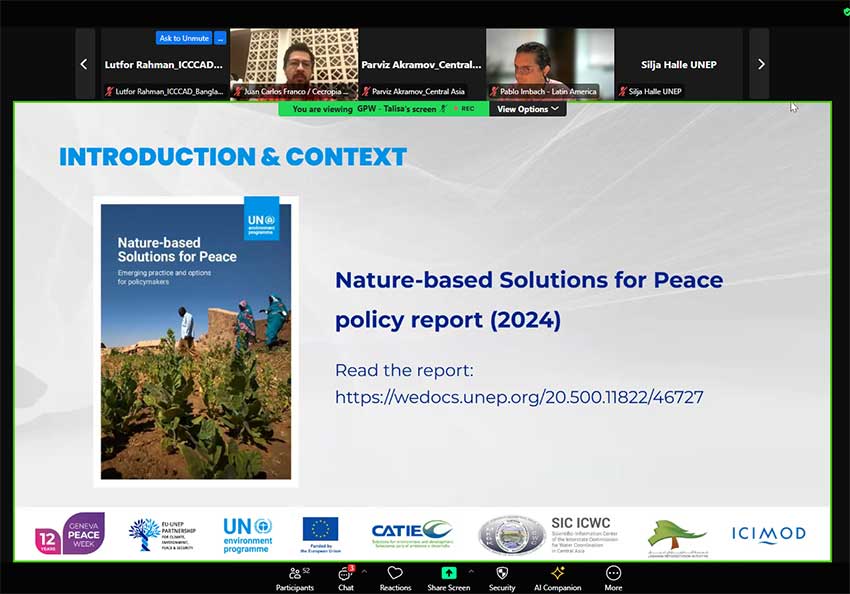
More information/written by:
Ileana Ávalos Rodríguez
PARES Project Coordinator
Climate Action Unit
CATIE
ileana.avalos@catie.ac.cr
Tag:climate, peace, resilience

